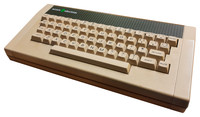Acorn Electron (Box with Tile Design)
| Home > Browse Our Collection > Computers > Acorn Computers > Acorn Electron (Box with Tile Design) |
|
The Acorn Electron was designed to be a less expensive alternative to the BBC Micro, which due to its many expansion options and high build quality was a very expensive machine to buy for the home at £399.99. This meant that the computer had little impact on the home market, and most people would only see one in computer classrooms, or would need a large income to have one at home. Other cheaper micros such as the Spectrum and C64 were selling into the home in far greater quantities. As the machine chosen by the BBC and government for their computer literacy program, this was not an ideal situation, as the TV programmes produced were of little interest to someone who had an incompatible computer in their home. So Acorn were keen to have a slice of the home computer market, not only to keep the BBC Programmes relevant, but also to get a share of the lucrative games market for their software division Acornsoft, and of course a decent share in the hardware market. So they set about developing a small micro, that would retain the basic functions of the BBC, while being far cheaper to manufacture. The Acorn Electron was the result. It was in a far smaller case, had 32 kilobytes of RAM, and its ROM memory included a new and improved BBC BASIC along with its operating system. The hardware of the BBC Micro was emulated by a single customized ULA chip designed by Acorn. It had feature limitations such as being unable to output more than one channel of sound where the BBC was capable of three-way polyphony and the inability to provide teletext mode. The machine architecture also imposed a substantial speed decrease on applications running from RAM, although ROM applications ran at the same speed, this meant BBC games ran 3 times slower, if they ran at all, however, the price reduction from the BBC however was enormous, retailing initially for £199.99. The Electron is a very elegant design, and was designed round the basic size and shape of a tissue box. It was able to save and load programs onto audio cassette via a supplied converter cable that plugged into the microphone socket of any tape recorder. It was capable of basic graphics, and could display onto either a television set or a "green screen" monitor. To match the capabilities of the BBC, expansion units were sold separately and designed to plug into the back of the machine, the Plus One added a joystick port and cartridge slots, as well as printer and disk drive support, and the Plus 3 added a 3.5 disk drive. Although the machine was on paper compatible with the BBC, users soon found that a good deal of the BBC library would not work on the Electron, and it had to have it's own versions produced, so games such as Elite were written and released as separate copies. Going forward games were released as BBC/Electron, which were either written so they would run on both machines, or more commonly, they would contain the BBC version on one side of the cassette, and Electron on the other. The launch of the computer did not go well, the ULA chip was difficult to manufacture, and when fitted, only one in ten worked. Demand for the machine was high leading up to Christmas 1983, with 300,000 units on order. Unfortunately only 3,000 working units were delivered causing mayhem in the high street electrical stores. Many disappointed customers simply bought other machines such as the Spectrum and Commodore 64, the situation was also a bonus for the other micros who's machines were not selling well, such as ones by Sord, and Mattel. After the Christmas period, Acorn were faced with a new problem, the 270.000 machines that should have been for the holiday sales arrived, and of course not many were sold as people had been unwilling to wait and had other micros in their homes now. This was a major factor in Acorn having to be sold to Olivetti after this disastrous period in retail. After being acquired by Olivetti, the price of the Electron was slashed to £129.99, and began selling well. At its peak, the Electron was the third best selling micro in the United Kingdom, and total lifetime game sales for the Electron exceeded those of the BBC Micro. The Electron is popular among the retrogaming community, it is well built, with an excellent keyboard, and there are devices produced to load games instantly, and to expand the memory to 64K, so the newly written homebrew games that are still regularly produced can be played. Complete in its retail packaging, which has various tile designs, showing how the Electron could be used in daily life.
Serial Number : 06-ALA01-0028986
Manufacturer: Acorn Comment on This Page Other Systems Related To Acorn Electron (Box with Tile Design):This exhibit has a reference ID of CH66084. Please quote this reference ID in any communication with the Centre for Computing History. |
|
















